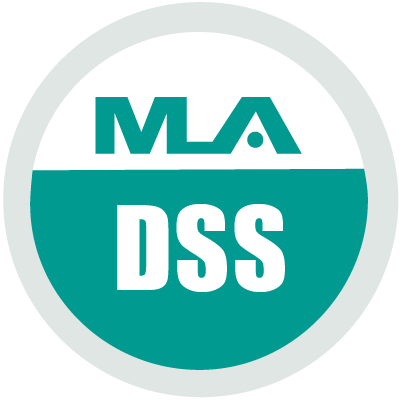Learn about the Data Services Specialization, a program that recognizes your skills in providing data services to researchers, clinicians, students, librarians, and others who work with data. Back to Specializations
About Data Services Specialization
What is DSS?
DSS stands for for Data Services Specialization, a program provided by the Medical Library Association (MLA). DSS indicates that you have received training in providing data services to researchers, clinicians, students, librarians, and others who work with data--and recognition for the accomplishment of acquiring skills in providing data services.
Why get a DSS?
As scientific research becomes increasingly data-driven, libraries are expanding their data services. Medical librarians and other health information professionals are ideally situated in the research and information-seeking process to provide data services support.
Your DSS shows employers, colleagues and researchers and others who work with data that:
- You have skills in providing a range of data services
- You are committed to offering quality data services
- You are committed to staying current with developments in data management and data services.
A DSS certificate gives you a solid grounding in all areas of the competency and the flexibility to choose additional learning based on your interests.

What Skills Does the DSS Promote?
What Skills Does the DSS Promote?
The competency encompasses five skill areas at two levels of expertise. A data services specialist:
- Applies principles of data literacy
- Basic: Finds, interprets, and manages data according to ethical principles
- Advanced: Critically appraises data and data collection methods
- Establishes and advances data services
- Basic: Collects and uses knowledge of institutional and research context to initiate institutionally relevant data services
- Advanced: Evaluates and expands upon existing data services by developing partnerships and becoming integrated into the institutional research environment
- Supports research data best practices across the data lifecycle
- Basic: Provides guidance on generalizable, domain-agnostic research data best practices
- Advanced: Identifies and implements domain-specific research data best practices
- Applies knowledge of research methods, ethics and rigor, and open science practices
- Basic: Applies a basic understanding of scientific method and ethical and sound research practices to data-related problems, encouraging open science practices when appropriate
- Advanced: Applies specialized knowledge of one or more scientific disciplines and research methods to advanced, domain-specific data-related problems
- Provides training and consultation on data-related topics
- Basic: Develops and delivers instruction to enhance data literacy and skills
- Advanced: Provides customized discipline- and context-specific training on advanced data-related topics, including those requiring computational approaches
How to Earn DSS Credits
How to Earn DSS Credits
DSS Level I
- To meet the core requirement, you can complete NNLM's Data Services On-Demand suite of four free, on-demand classes covering the five DSS skill areas. These courses are available for you to complete on your own time, and at your own pace. Each class takes about 4 hours to complete, and consists of self-paced readings, videos and knowledge checks.
Or:
- Complete the free 32 credit NNLM course Fundamentals of Health Sciences Research Data Management, offered intermittently from NNLM. Contact ncds@nnlm.gov for more information.
To meet the elective courses requirement you must take three elective credits in each of the five skill areas.
Visit the Data Services Specialization webpage on the Medical Library Association's website to view the requirements for Level 1 and Level 2 and to learn more about the benefits of obtaining the DSS.
Browse and register for NNLM's DSS courses.
NNLM Sponsorship and Application Fee
DSS Application Fee
The DSS application fee is $99 for MLA members and $132 for nonmembers. The DSS specialization is valid for 3 years, at which point it must be renewed. Courses offered by the Network of the National Library of Medicine are free.
NNLM Sponsorship
NNLM application fee sponsorships are available to residents of any NNLM region and U.S. citizens living outside the U.S.
NNLM can sponsor your DSS application fee. Once you've completed the necessary coursework, apply for NNLM sponsorship through our DSS Sponsorship Application.
